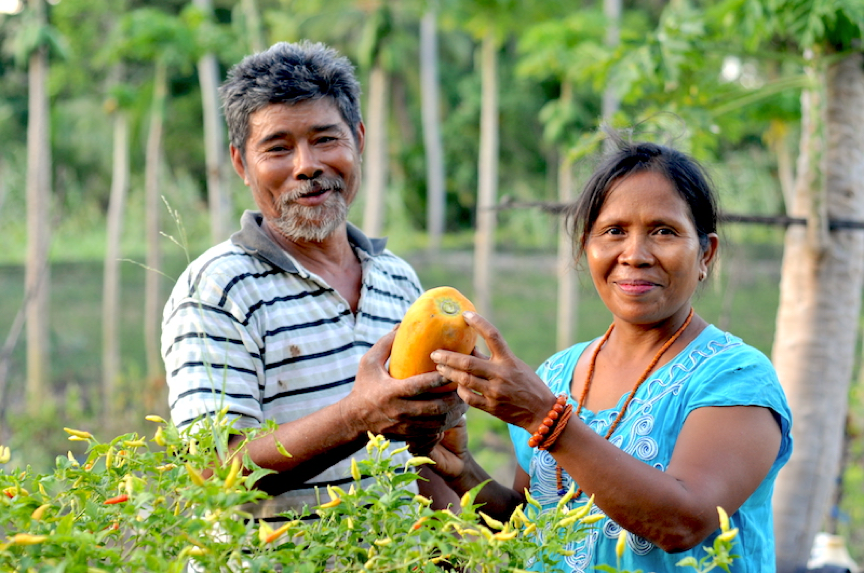Mama Rian: From Consumer to Producer
"Now it's different after the training and getting knowledge from IDEP," said Carolina Yaku Danga when she talked about the benefits after participating in permaculture training in her neighborhood at RT 15, Watumbaka village, East Sumba. Other than Mama Rian, as she is familiarly called, 15 other residents also participated in the training held in early 2018.

The training she mentioned earlier is a part of the Collaborative Habitat Advancement Management Program (CHAMP) organized by Yayasan IDEP Selaras Alam in collaboration with PT HM Sampoerna Tbk. Apart from RT 15, CHAMP is also located in five other RTs spread in Watumbaka and Kawangu village, East Sumba.
Through this program, community gets assistance to improve their quality of life sustainably while preserving the environment at the same time. In addition to community capacity building through permaculture training, the program also contains activities such as clean and healthy living behavior campaigns, provision of access to clean water and proper sanitation, and the use of environmentally friendly energy technologies.
While taking a tour around her family's garden, Mama Rian shows how she and her family applied permaculture. In the garden, there are about 15 beds with various shapes like heart, letter, spiral, semicircle and rectangle with coconut husk covered all the edges of beds. The plants are various, ranging from Chinese cabbages, eggplant, water spinach, tomatoes, chili and papaya. There are also some seasoning plants such as onion, ginger, coriander and lemon grass. With the poly culture system, each bed is planted with more than one type of plants.
As permaculture principles applied, they treated their gardens without using chemical fertilizers or pesticides that are often used in modern agriculture system. Instead, they re-take advantage of using natural materials that they easily found in their neighborhood.
From the gardens, Mama Rian and residents in her neighborhood are now able to meet their family needs of healthy food. At the same time, this also directly reduces spending on their daily consumption. Not only that, they even generate income from the sale of their surplus crops.
Before the training, they always bought vegetables from mobile seller. Sometimes, they buy it from the market that is very far away. It happens almost everyday for years. But now the situation is different since they can harvest vegetable from their own garden.
"We have almost never buy vegetables from outside anymore. If the vegetables we wanted were not in the garden, we bought them from the neighbors. And so with our neighbours, if they do not have ones, they buy it from us," explained Carolina who is also a chairman of RT 15. "After we make sure the supply for our daily needs, we sell the other part of crops to the market. As we get to the market, we do kind of barter. We sell tomatoes and then we buy fish with the money from tomatoes. And so with our neighbors, they also do it," she continued.
According to their testimonials in a meeting, they are now able to save Rp150.000 per month on average. And at the same time, from the sale of their surplus crops, they are now able to generate income up to Rp500.000 per month on average.
Besides the benefits of training, Mama Rian also talks about other advantages they get ever since CHAMP was started. One of them is about the closer access to clean water facilities in the form of a solar power well connected to a number of sinks and taps nearby their settlement. From there, the need for clean water of 6o people in their RT and 265 people in five other RTs can now be fulfilled.
"We are very grateful for such assistance. Makes it easy for everyone to get water for drinking, bathing, cooking, etc. The water is closer. So we're not that hard anymore. Both in the dry season and rainy season, we can still get clean water," she concluded.
Living in remote parts of East Sumba, such as in Watumbaka and Kawangu, is not easy. The only water source comes from a nearby river that is very vulnerably polluted by chemical pesticide residue, household waste and animal waste carried from upstream. Their habit of carelessly defecation around the river put the water condition in danger for their health.
In addition to the environmentally friendly solar power wells, both communities in Watumbaka and Kawangu now also have sanitation facilities in the form of toilets. In addition to the healthier, proper and "natural" reasons, the toilet was built by applying the Waste Water Garden (WWG) system to be environmentally friendly. In WWG system, polluted water from toilet is firstly filtered through a number of plants planted in the toilet before polluting the soil and surrounding environment. Furthermore, after being filtered, the water can be used to irrigate the garden.
At the end of her story, Carolina expressed his intention to share her knowledge and experience to wider people. "Well, we are very grateful for being trained. However, we also want to train our friends who have not participated in the training yet. Because we want the others, in Watumbaka Village even in East Sumba, to also follow what we have been experienced, especially in gardening vegetables." (Ed)
This article had been published on Pos Kupang on May 19th, 2018.
Subscribe to IDEP Newsletters
Give a gift that will change lives. 100% funds charity projects.
|






